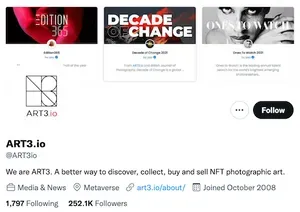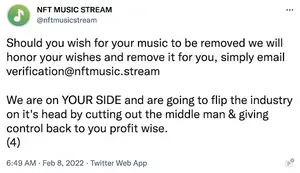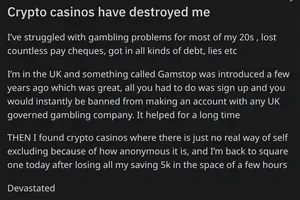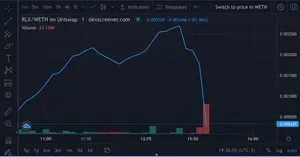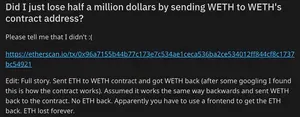Hackers take more than $10 million from defi project Dego Finance
Creator of Skycoin files lawsuit claiming he was extorted and kidnapped
One defendant in the lawsuit has described the suit as "absurd" and "pretty weird", and said that Smietana has "a history of blaming other people for the failure of Skycoin".
Canadian antivaxxers try shilling crypto after failing to fund their trucker protest
The protesters eventually turned to Bitcoin and other cryptocurrencies for crowdfunding, even appointing a "Bitcoin team lead" who rambled on in a livestream about not "being shackled by the censorship put in place by our legacy financial system", much to the confusion and annoyance of some viewers. One commenter asked, "Are we at a press conference for Freedom Convoy 2022 or having some guy shove Bitcoin down our throats?" As of February 9, the group claims to have raised $300,000 in Bitcoin, and $500,000 in other cryptocurrencies.
Baby Musk Coin rug pulls after a $2 million January ICO
Samsung launches environmental sustainability-themed metaverse scavenger hunt where people plant virtual trees and earn NFTs
The press release doesn't happen to mention that the Decentraland project is built on Ethereum, which was at the time a proof-of-work blockchain that used over 100 TWh of electricity per year — around the same amount as countries like the Netherlands or Finland.
The BBC publishes (and then deletes) a puff piece on a "self-made crypto-millionaire giving back" without mentioning his scam coin
- "Birmingham's self-made crypto-millionaire giving back", originally published by the BBC and archived on the Internet Archive
- Tweet thread by Jim Waterson
- r/Orfano
- "BBC cryptocurrency documentary pulled from air at last minute", The Guardian
Someone appears to trade on insider knowledge of Coinbase listings
- "Evidence of Insider Trading at Coinbase", FullyCrypto
$36 million taken from retirement accounts of IRA Financial customers investing in crypto
Exploit of Superfluid vesting contract nets attacker $8.7 million
Longstanding British photography institution baits-and-switches investors with NFTs
On February 2, some Twitter users were confused to find themselves suddenly following the Twitter account of an NFT operation, as BJP had taken its existing 250,000-follower Twitter account and rebranded it to "ART3.io" and begun promoting various NFTs with posts of "gm". The primary BJP organization started a new Twitter account, @bjp1854, which had a total of around 1,500 followers. On February 8, investors received an email from BJP announcing the company had been sold, and that they would be paying back shareholders £50,000 of the £1.8 million, a 92% loss.
U.S. Department of Justice arrests duo for trying to launder billions stolen from Bitfinex in 2016
News of the arrest came only a week after 20,000 BTC from the Bitfinex hack was observed being moved. Although the DOJ didn't explicitly say that this movement led to the arrest, it seems like a safe bet.
LooksRare team cashes out $30 million in wETH, panicking their community
The discovery of the withdrawal caused panic, with some community members believing it was a sign that the team was rug pulling. Some also questioned the team members' choice to send the funds to a cryptocurrency tumbler, believing this meant they were trying to hide the cash-out from community members. One might understand why they would try to hide it: after the withdrawals became public, the value of the native $LOOKS token crashed around 15%.
More broadly, the fear around the team cashing out illustrates a common belief among some crypto project communities: that if you cash out even some of your holdings, you're not a true believer. A LooksRare team member explained that the team behind the project had "been grinding night and day for 6+ months" without payment and had collectively fronted "more than 7 figures in costs" before the platform launch (reassuring!), and the withdrawal was simply 10+ team members finally receiving payment. Apparently unsatisfied with this explanation, the community tried to demand the team use their wETH to repurchase $LOOKS, though it doesn't appear this has happened.
SuperRare parts ways with its community manager over racist tweets, she hosts a disastrous "apology" Twitter Space
However, as the Space continued and amassed several thousand listeners, several Black women stepped up to express that her apologies didn't seem genuine or self-reflective, and that the Space appeared to be little more than an opportunity for other white people in the web3 community to "forgive" her and pat her on the back, as she gained followers throughout. The women who spoke up immediately began to receive extraordinarily racist and threatening mentions and direct messages on Twitter from various people in the Space.
As the Space was ongoing, more of Christenson's past tweets surfaced, several considerably more recent than 2011, and none involving song lyrics: several that were racist towards Mexicans and one that appeared to be questioning the experiences of rape survivors. When one speaker asked how old Christenson had been when she made the 2016 tweets about Mexicans, Christenson initially dodged. When another listener repeated the question she answered that she had been 26, but that research shows that your frontal lobe isn't fully developed until you're 25... or something. As the Space continued, Black web3 community member mec. kindly suggested that Christenson end the Space and take some time to genuinely reflect. As more Black speakers expressed that they felt hurt by Christenson's actions, the Space abruptly ended. Although the Space was being recorded, Christenson took down the recording shortly after.
Another project tries to sell music NFTs without permission from artists
Also like HitPiece, NFT Music Stream claimed to be doing artists a favor, tweeting, "We are on YOUR SIDE and are going to flip the industry on it's[sic] head by cutting out the middle man & giving control back to you profit wise." They also wrote, "I think a lot of people are missing the point of the project", apparently not understanding why musicians might be less than thrilled to see their work resold without permission.
EarnHub claims they've been hacked for around $284,000
NFT marketplace Cent shuts down over "rampant" fakes and plagiarism, founder says "I think this is a pretty fundamental problem with Web3"
Ubisoft holds internal workshop to address major employee concerns about NFTs, delivers celebratory NFT to employees
Meanwhile, Ubisoft announced that they were creating a celebratory virtual hat NFT to gift to their employees in early March, in honor of the opening of the Ubisoft Quartz NFT platform. Maybe just give them a cash bonus next time.
The team behind Doodled Dragons rugpulls again with "Balloonsville", taunts buyers and the NFT platform they used
UN reports that millions of dollars in stolen crypto have gone towards funding North Korean missile programs
Contracted developer makes off with all the funds for the Ratz Club NFT project
- Tweet by Zilverk (in Spanish)
- Medium post by Ratz Club
ENS governance put to the test as a bigoted 2016 tweet from its director of operations resurfaces
On February 6, the ENS community stewards voted to remove Millegan from among them, and the following day the nonprofit behind ENS announced that they had terminated Millegan's contract as director of operations. As of February 7, Millegan still holds the largest share of voting power in the ENS DAO.
Meter Passport, another blockchain bridge, is exploited for $4.3 million
Trader trying to cash out their rewards from a DeFi platform loses more than $35,000 to a Twitter support scammer
The trader reported that they lost more than $35,000. They wrote in a Reddit post, "I was unemployed and literally solely yield farming to hedge my student loan. I deposited almost the same amount of my debt, and was leveraging the fact that the return I was getting was higher than my loan's APR. While trying to earn $8-9 more, I lost $35k and my financial freedom."
- "I just lost over $35k to scammers. Beware out there." post on r/defi
Former Gumroad freelancer tweets that he no longer works for the company because the company was planning to get into NFTs, Gumroad founder has a bit of a meltdown
By that evening, the tweets attacking their former employee and leaking customer data were all deleted, and the Gumroad account had pinned a tweet saying, "If and when we do anything related to crypto/NFTs, you'll hear it from us first. For now, no plans."
Someone tries to take out a loan against their Bitcoin holdings to get a mortgage, loses over $300,000
Even if things had worked out as this person planned, it seems like the bank might have wanted to know where $300,000 suddenly came from, and I don't know how "I took out a sketchy loan against my Bitcoin holdings, which you already don't think can qualify me for a mortgage" would have shaken out.
- "Blockfi Horrible Loan Experience (FORTUNE Lost)" on r/CryptoCurrency
Hackers steal $1.9 million from KLAYswap crypto exchange
Nike sues StockX for selling unauthorized NFTs of their shoes
This lawsuit is somewhat similar to the January lawsuit by Hermés against artist Mason Rothschild, who has been selling "MetaBirkin" NFTs (though MetaBirkins describes itself as an art project, and promises no physical items).
Miami mayor Francis Suarez's MiamiCoin gambit lands the city $5.2 million, investors not so lucky
On February 2, Suarez excitedly announced that they had received their "first-ever disbursement... totaling $5.25M". He didn't mention that the coin is trading at 90% below its all-time-high and 35% less than its initial price of $0.01. Both the OKCoin exchange and the coin creator previously advertised that buyers could earn "430% APY" by participating in some sort of staking program with the coin. All current holders of the coin, such as the Miamians Suarez encouraged to invest, have lost money even when factoring in staking rewards, says Protos.
Wormhole, a cross-blockchain bridge, is hacked for more than $320 million in one of the largest hacks to date
Game studio behind Worms games series does a quick U-turn on their NFT project after massive backlash
HitPiece catches heat for selling song and album NFTs without seeking consent from the artists
 You have to admit they have guts for so prominently listing stolen IP from the notoriously-litigious Disney (attribution)
You have to admit they have guts for so prominently listing stolen IP from the notoriously-litigious Disney (attribution)The project's website writes, "Each time an artist's NFT is purchased or sold, a royalty from each transaction is accounted to the rights holders account." They do not write about how this is supposed to work when the artists have had zero involvement in the NFT being created to begin with, or have no cryptocurrency wallets at all. The FAQ also includes a hilariously handwavy answer to the question most people learning about NFTs have: "What utility does owning an NFT give me?" HitPiece writes, "Artists provide NFT owners access and experiences."
Someone sends COVID-19 NFTs to all ~100,000 active users of the HEN NFT marketplace, whether they want them or not
About 30 posts in a subreddit about gambling addiction mention crypto in the month of January
Regardless of whether they are trying to use blocking software or not, some people in the subreddit appear to be struggling with the challenges presented to them by cryptocurrencies. Some speak about gambling in cryptocurrency casinos, while others have realized that the behaviors that many people involved with cryptocurrencies simply refer to as "investing" are actually manifestations of their gambling addiction. One poster wrote, "Realised yesterday whilst out walking my dog that i'd used crypto as a way to satisfy my gambling urges. I've self excluded from gambling sites for a few years now and managed to taper off. Crypto pulled me back in with trading. I was lying to myself that I was 'investing' so its fine which eventually turned into 24/7 chart watching and leverage trades."
The World Wildlife Fund announces their upcoming NFT project... for nature!
This was not the WWF's first foray into NFTs — the German arm of the WWF released a "Non-Fungible Animals" NFT project in November 2021, which has enjoyed less than $10,000 in trading volume. It also did't appear to be the only project the WWF UK had planned — their NFT website advertised upcoming collaborations with CyberKongz (built on the Ethereum blockchain) and World of Women (also built on the Ethereum blockchain).
Realux, a project promising to "democratize" and "resolve the wealth gap" in real estate, rug pulls $23,000 only hours after launch
After backlash, Troy Baker announces he will no longer be partnering with the "voice NFT" project Voiceverse
All "iloveponzi"'s apes gone! Veteran hacker makes $700,000 stealing and flipping big name NFTs
Tax season begins to hit crypto Reddit hard
Questions like "How can crypto be a viable currency if every transaction is taxed?" are beginning to pop up as well, and more than a few commenters have described their plans to not report any of their crypto activity — certainly a wise thing to be discussing on a public Internet forum.
Streamer Ice Poseidon admits to scamming his followers out of $500,000 with his "Cxcoin" made for streamers
On January 31, 2022, a YouTuber named Coffeezilla released a video in which he confronted Denino about his actions and urged him to return the money to his fans who'd bought in on the project. Denino replied, "I could give the money back, it is within my power, but I am going to look out for myself and not do that." According to Coffeezilla, Denino took a total of $200,000 from the token's presale, $250,000 that was earmarked for marketing, and $300,000 from the liquidity pool. In the end, Denino pocketed around $300,000 and his developers took around $200,000. After realizing that Coffeezilla would be releasing the interview, Denino promised to "use the buyback function to put 155k into the liquidity" — which turned out to mean 155,000 BNB rather than dollars, roughly equivalent to around $40,000.
- "This Famous Livestreamer Stole $500,000 From His Fans", video by Coffeezilla
- Tweet by coffeebreak_YT
Someone starts selling colors on the blockchain, because why the hell not I guess
Qubit continues to try to tempt the attackers who stole $80 million to return it, with increasingly-desperate messages
Wonderland protocol founder writes that the "Wonderland experiment is coming to an end", despite vote ongoing and majority of participants voting to continue
By raw numbers it appeared most investors opposed the idea, as many will receive miniscule amounts compared to their initial investments. However, the larger holders (most of whom bought in at low prices) stand to make money from the liquidation and some have supported winding down. Because the DAO voting operates in a plutocratic model, where people can vote based on how many tokens they hold, at one point votes from a relatively small number of whales were trending the vote towards supporting winding down even though 90% of individuals wanted the project to continue. The votes to continue had begun to beat out the votes to wind down when Daniele Sestagalli announced on Twitter on January 30, before the vote's scheduled end, that the "Wonderland experiment is coming to an end."
Ultimately, Sestagalli ended up respecting the wishes of the community, who decided to continue the project despite having lost 90% of their money, presumably in hopes of regaining some of the losses.
- "Wonderland votes out QuadrigaCX co-founder Sifu and is considering shutting down", The Block
- "Wind down Wonderland, and give the treasury back to its holders?" vote on Snapshot
- "ELI5 - Explain to me like I'm 5" - The consequences of WIP #4" post on r/WonderlandTIME
- "What is really happening with the vote" post on r/WonderlandTIME
- Tweet by danielesesta
Justin Bieber "buys" a Bored Ape for $1.3 million in a deal that is shady in one of two possible ways
Trader loses $510,000 trying to convert funds between two currencies
Transaction history on Etherscan shows they were the 265th person to make this mistake. Most people did so with far smaller amounts of WETH, although another unfortunate trader lost 115 WETH (at the time valued at $360,000) on August 11, 2021. A total of 432 WETH has been irretrievably lost to this contract this way since July 2018 — currently valued at $1.1 million.
Fake Bored Ape project pulls in $17,500 following high-profile endorsement of Bored Apes
Lazy Lion Ape Club rug pulls for 50 ETH ($125,000)
Khan Academy charity auction ends in blatant wash trade, and Khan Academy removing several former employees from alumni Slack channel for raising concerns
The auction ended on January 21, with a winning bid of 77 ETH (nearly $200,000) from ParagonsDAO, plus the promise of another 34 ETH ($87,000) donation from the DAO to Khan Academy. However, ParagonsDAO is a DAO created specifically to "play a key role in Parallel's governance" and "support the creation of an ecosystem for Parallel to thrive". Former Khan Academy employee S. M. Lundberg raised their concerns about the wash trading, and "KA elevat[ing] Parallel on its own channels to a largely underage and under-resourced user base" in the Khan Academy Slack, and was removed from the channel by Khan Academy founder Sal Khan. At least three other former employees were removed from the channel for criticizing the decision to engage with the NFT project, as was an additional person who protested the removal of those raising concerns.
Although the auction ended with more than $250,000 going to Khan Academy, it is likely that Parallel got the better deal here — Khan Academy is an enormous name to have promoting one's project. Sal Khan actively hyped the project in various spaces, including in an appearance on CNBC's Squawk Box.
87% of trades on LooksRare NFT platform reported to be wash trades
Wash trading is also a widespread tactic in the NFT space to artificially inflate the "value" of an NFT. Because it's relatively easy to create a pseudonymous cryptocurrency wallet, users will "sell" NFTs to themselves for large amounts to create the appearance of higher demand, and to try to convince other would-be buyers that the NFT is more valuable.










